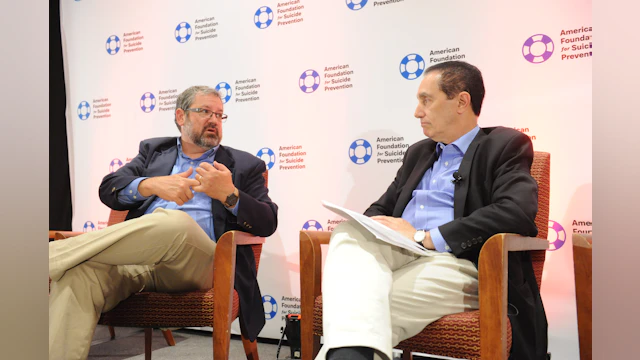After approval in the U.S. Senate and House of Representatives, on Friday, September 28, President Donald Trump signed the FY19 Labor HHS and Education Appropriations Bill, which increases funding for the National Suicide Prevention Lifeline (1-800-273-TALK), National Strategy for Suicide Prevention Grants, and to the National Institute of Mental Health for research.
You can read AFSP’s statement on the bill here.
Oct. 1, 2018- Increasing federal funding for suicide prevention research is one of the highest priorities for AFSP. This year, during our annual Washington, D.C. Advocacy Forum in June, AFSP urged Congress to prioritize suicide prevention research by increasing funding by $150 million for the National Institute of Mental Health (NIMH). AFSP’s Volunteer Field Advocates met with all 100 Senate offices and over 375 House offices, and advocated for increased research funding.
During the Advocacy Forum, AFSP CEO Robert Gebbia moderated a conversation with Dr. Joshua Gordon, Director of the NIMH. The focus of the conversation was on future suicide prevention research and the need for novel treatment and investment into studies related to suicide and mental health. Dr. Gordon began by highlighting that suicide rates have been tragically increasing over the past twenty years. In response to rising suicide deaths, the NIMH has embraced AFSP’s ambitious goal to reduce the national suicide rate 20 percent by 2025 by focusing on data driven solutions to make a difference.
When suicide prevention research findings are implemented, strategies like risk identification, effective treatment approaches, and tactics for dissemination of resources can be evaluated. Clinicians, patients, and families are considered and consulted throughout the research process. Advocacy for research is essential, because we know that it can make real, life-saving change.
When Congress prioritizes funding for research in response to public health issues – like cancer, heart disease, diabetes, and Alzheimer’s – we see that the mortality of these diseases decreases in relation to the amount of research funding they receive. Through advocacy, we can urge our elected officials to prioritize research for suicide prevention, because it is good policy. Research leads to solutions that yield more preventative and treatment measures. Considering that suicide costs the United States $69 billion every year in combined medical and lost economic opportunity costs, funding research is a smart investment.
Research has proven that suicide is preventable. Research has also shown that means reduction, risk evaluation, and preventative strategies can save lives. Currently, AFSP is urging Congress to increase funding to NIMH, the Centers for Disease Control and Prevention, and the Substance Abuse and Mental Health Services Administration to answer essential questions and find actionable solutions to one of this country’s leading causes of death.
During National Suicide Prevention Week, Mr. Gebbia called on legislators to increase funding for suicide prevention research. Consequently, the NIMH has received additional funds for suicide prevention research for the 2019 fiscal year. These increased appropriations are victories for suicide prevention, and we thank our Field Advocates for their tireless efforts in supporting this work by contacting their elected officials.
To watch AFSP CEO Robert Gebbia discussing National Suicide Prevention Week and legislation related to suicide prevention on CSPAN, click here.
To learn how you can become an AFSP Volunteer Field Advocate, click here.
